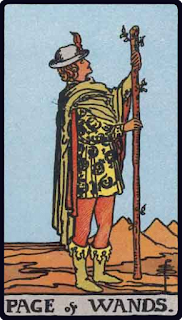
Representing study; the Page of Wands represents our attempts to research, reflect, and understand what has been achieved, what can be learned, and how we can plan for the future.
In the upright state the Page of Wands asks us to look back objectively at what we have created and reflect on the process as a whole, to consider what can be learned. We are asked to consider if we were to undertake such an endeavour again what would we do differently and what would we do the same.
In the inverted state the focus shifts from our creative process to the creative output itself. Instead of examining the means of production we examine the product. We are asked to be objective once more and consider what we have produced and whether it has merit or value, what flaws does it contain and what perfections.
In the Rider-Waite deck the Page of Wands depicts a young man with a feather in his cap representing pride in achievement, examining a single wand admiring the craftsmanship. This depiction represents reflection and contemplation, illustrating our attempts to gain understanding, we are warned once more not to succumb to narcissism and the seduction of nostalgia that inspires reminiscence; always remember to return your focus to the present and in turn to the future after contemplating the past.
In self-reflection the Page of Wands serves as a prompt to consider the skills and abilities that have been learned and identify the areas of shortfall; this is an opportunity to plan for future growth and further study, not for this endeavour in particular but for others as yet unimagined.
?Ask yourself “What worked and what didn’t?” and “What would I do differently next time?” – whilst the stress and strain we endure in pursuit of creativity can be such that we are eager to abandon our efforts once we see them through to fruition, it is important to reflect on what we have achieved.
Recognising our accomplishments, and acknowledging the growth and transformation within ourselves that occurred as a result can help us to see the reward for our hard work and allow us to better gauge the merit of the commitments we made.
Your key focus here should be recognising what you learned as a result of this process, ask “What did I not know going into this?” and reflect on the change within you that resulted from that learning process. Simple truths and what can seem like insignificant moments can often end up staying with us for life fundamentally changing our perspective in ways we do not come to recognise until many years have passed – there is no time limit for the Page of Wands to comprehend.

No comments:
Post a Comment
All comments are moderated before they are published. If you want your comment to remain private please state that clearly.